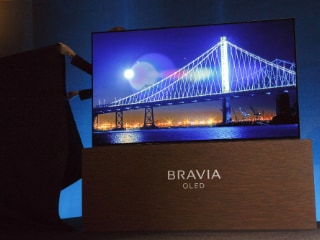- Home
- Mobiles
- Mobiles Features
- Moto G6 and E5 Launched, Jio Home TV and OnePlus 6 Rumours, WhatsApp New Features, and More News This Week
Moto G6 and E5 Launched, Jio Home TV and OnePlus 6 Rumours, WhatsApp New Features, and More News This Week

Moto G6 launched but no India price or launch date revealed yet
This week, in all the tech news that you can use, we start off with a look at the latest from Lenovo-owned Motorola. After a lot of leaks and teases that continued through this week, we finally got the launch of the Moto G6 family of phones. The company has released the Moto G6, Moto G6 Plus, and Moto G6 Play, which start at $199 and go up to EUR 299 - India price and release date of the phones has not been announced yet.
The Moto G6 Plus has a 5.93-inch full-HD+ display with 18:9 aspect ratio. It runs on the 2.2GHz octa-core Snapdragon 630 processor, with 4GB of RAM. There is a dual-rear-camera setup with a 12-megapixel primary sensor and a secondary 5-megapixel sensor, while an 8-megapixel camera on the front. It comes with 64GB of storage, and 3200mAh battery, and is priced at EUR 299 (about Rs. 24,350).
The slightly smaller Moto G6 has a 5.7-inch full-HD+ display with an 18:9 aspect ratio. It's powered by the 1.8GHz octa-core Snapdragon 450 SoC and 3GB RAM. It has a similar dual-rear-camera setup with a 12-megapixel primary sensor and a 5-megapixel sensor, and 8-megapixel front camera. It comes with 32GB storage, and a 3000mAh battery, and is priced at $249 (roughly Rs. 16,500).
The Moto G6 Play is the most pocket friendly of the lot, and that shows in some of the specs. Although it also has a 5.7-inch display with an 18:9 aspect ratio, it's running on HD+ resolution instead, and there's a 1.4GHz octa-core Snapdragon 430 inside. It's got 3GB of RAM and 32GB storage as well, and a single 13-megapixel camera on the back, and 8-megapixel camera on the front. The highlight of the Moto G6 Play is the large 4000mAh battery, and it's priced at $199 (approximately Rs. 13,000).
Along with the Moto G6 series, Lenovo-owned Motorola has unveiled the Moto E5 series of smartphones to cater to the entry-level segment. The new offerings - the Moto E5, Moto E5 Plus and Moto E5 Play - will be positioned below the respective Moto G6 models. While the price of the Moto E5 Play hasn't been revealed yet, we do know that phone will be restricted to the US market.
Moto G6 vs Moto G6 Play vs Moto G6 Plus: What's the Difference?
The Moto E5 Plus has a 6-inch display with 18:9 aspect ratio and HD+ resolution, and it's powered by a Snapdragon 435 SoC with 3GB of RAM. There's a 12-megapixel camera on the rear, and an 8-megapixel camera on the front, and the handset comes with 32GB of storage. The highlight though is its huge 5000mAh battery. The Moto E5 Plus will cost EUR 169 (approximately Rs. 13,700) - and while it's coming to India "over the coming months", price in India was not revealed.
Android Go Back to the Drawing Board Because This Isn't Working (Yet)
The Moto E5 is the same size as the Moto G6, with a 6-inch 18:9 aspect ratio display, but it's also at the HD+ resolution. It's running on a Snapdragon 425 SoC with only 2GB of RAM, and it has a smaller 4000mAh battery. The phone packs a similar 13-megapixel rear camera, while on the front you get a 5-megapixel camera, and there's 16GB of storage. The Moto E5 is priced at EUR 149 (around Rs. 12,000).
The Moto E5 Play doesn't have an official price yet and won't be coming to India, and it's also the only new phone in both series that doesn't have an 18:9 aspect ratio display. It has a 5.2-inch HD display, with a 2800mAh battery, and will be powered by either Snapdragon 425 or Snapdragon 427, Motorola says. The phone will have 2GB of RAM, and 16GB storage, along with 8-megapixel and 5-megapixel rear and front cameras, and a 2800mAh battery.
Moto E5 vs Moto E5 Plus vs Moto E5 Play: What's the Difference?
Oh and in case you're not keen to wait for these phones to come to India and want something you can buy right now - some good news as the Moto G5S got a price cut in India, just ahead of the Moto G6 launch. The phone was launched last year priced at Rs. 13,999, and it's gotten a huge Rs. 4,000 price cut, bringing it under Rs. 10,000.
The Moto G5S has a 5.2-inch full-HD display, and runs on a 1.4GHz octa-core Snapdragon 430 SoC with 4GB RAM. There's a 16-megapixel camera on the back, and a 5-megapixel camera on the front. The phone comes with 32GB of storage, and packs a 3000mAh battery.
Best Phones Under Rs. 10,000 You Can Buy in India Right Now
Meanwhile, if rumours are to be believed, Reliance Jio is likely to enter the TV race, with the upcoming launch of Jio Home TV. This is believed to be based on Enhanced Multimedia Broadcast Multicast Service (eMBMS) - a TV over LTE stream, separate from Jio's to-be-launched DTH service. According to a report, Jio Home TV will offer SD (Standard Definition) channels for a monthly price of Rs. 200 and SD + HD (High Definition) channels for Rs. 400 per month.
eMBMS that Jio apparently plans to use is a hybrid technology that combines the capabilities of TV channel and radio architecture to broadcast HD content in high volumes, and it won't require an active Internet connection to use. This won't be on-demand streaming, but rather live TV on your phone, that is parallel to your data use.
Aside from this, Reliance Jio already has a number of apps providing content included in its Jio Prime subscription. With Jio Cinema you get access to VoD streaming, while Jio TV allows you to stream live TV. In both cases however, you're streaming the data over the Internet, and these can be accessed even if you're not connected to your Wi-Fi, but Jio Home TV will only work as long as you're getting the LTE signal. Hopefully, we'll know more about the Jio Home TV India launch soon.
It was also a busy week for Facebook-owned messaging platform WhatsApp. Right at the start of the week there was an important update to WhatsApp Payments in India. The BHIM-UPI payments on WhatsApp have been rolled out as a beta, slowly adding features, and the latest one is requesting money. If you're using WhatsApp Payments, you can now request money from other people, by entering their VPA IDs, or scanning their QR code. It's an important step forward and brings WhatsApp Payments one step closer to a final rollout.
There were more updates from WhatsApp though. For one thing, you can now recover deleted media from your WhatsApp chats. If your friends send you a photo or a video on WhatsApp, it would be removed after you downloaded it to your phone, and deleting meant that it was gone forever.
With the latest update however, WhatsApp continues to hold your media on its servers even after you download it. As long as you haven't deleted the message which contained the media file, you'll be able to re-download it later if need be. However, WhatsApp does not seem to let us download media files that are too old, instead asking us to send a request to the sender to send the media again.
WhatsApp also added a 'Dismiss as Admin' feature that is aimed at WhatsApp groups. It gives admins the power to demote other admins, without having to remove them from the group. Apart from that, it's also got another feature called High Priority notifications, which will help users to manage push notifications better.
If you're looking to buy the OnePlus 6, it was announced on Saturday as an exclusive for Amazon India. You can now sign up to be notified as soon as the phone goes on sale in India. The phone being an Amazon exclusive had already been revealed earlier, and the company's latest update did not give any further details. What we did get earlier in the week was a tease that all but confirmed that the OnePlus 6 will have some kind of water resistance.
There were a couple of other minor updates that continue the build up of the smartphone. OnePlus is looking for suggestions from fans to help launch the OnePlus 6 as the company also confirmed a partnership with Marvel that could result in a OnePlus 6 Avengers: Infinity War Edition. Later in the week, we saw a OnePlus 6 mockup video based on the leaks so far, while OnePlus also announced a OnePlus 6 Lab Community Review Programme, a way for consumers to get early access to the latest flagship.
Another phone to look out for is the Asus ZenFone Max Pro - whose launch details came to light earlier in the week. This is a Flipkart exclusive, and Asus confirmed that the phone will come with a Snapdragon 636 SoC. Ahead of the launch, the Asus ZenFone Max Pro (M1) specifications were leaked.
The phone apparently will have a 6-inch 18:9 aspect ratio display, and the Snapdragon 636 SoC was also spotted. Apart from that, we got to know a little bit more about the rear camera. The Asus ZenFone Max Pro (M1) will allegedly have a dual-rear-camera setup, which includes a 16-megapixel sensor for the primary camera. The phone has been tipped to launch in two variants, one with 4GB RAM and 32GB storage, and another with 6GB RAM and 64GB storage. The Asus ZenFone Max Pro (M1) is said to pack a 5000mAh battery.
We also got to know that the new Huawei flagship phones - the Huawei P20 Pro and Huawei P20 Lite - will be launched in India as Amazon exclusives. The company confirmed the two phones will launch on April 24 in India. The P20 Pro has a triple-rear camera setup as its highlight, while the P20 is its smaller variant with dual rear cameras. The Huawei P20 price has been set at EUR 649 (roughly Rs. 52,200), while the P20 Pro price has been set at EUR 899 (roughly Rs. 72,300). Pricing and availability details for the Indian market will be revealed on April 24.
The Huawei P20 Pro has a 6.1-inch panel while the P20 Lite gets a slightly smaller 5.84-inch display, both running at full-HD+. While the P20 Pro is powered by a HiSilicon Kirin 970 SoC, the P20 Lite has a HiSilicon Kirin 659 SoC. They come with 6GB of RAM/ 128GB storage and 4GB of RAM/ 64GB storage respectively. Most interestingly, while the P20 Lite has a dual camera setup on the back, the P20 Pro has a triple-rear-camera setup, featuring an 8-megapixel sensor that gives up to 3x optical zoom, a 40-megapixel RGB sensor, and a 20-megapixel monochrome sensor.
Plenty of news from Xiaomi as well. For one, the launch date for the Mi 6X, aka Mi A2, has been confirmed as April 25. Xiaomi has teased a Blue colour variant of the Mi 6X showing off the back panel of the handset. The Mi 6X appears to come with an Apple iPhone X-like vertically aligned dual cameras and a 20-megapixel front camera, and a fingerprint sensor.
The Xiaomi Mi 6X aka Mi A2 is expected to launch in five colour variants and is expected to feature a Qualcomm Snapdragon 660 SoC, coupled with 4GB/ 6GB of RAM and 32GB/ 64GB/ 128GB inbuilt storage. It's supposed to have a 5.99-inch full-HD+ display, and a 2910mAh battery. We also got a look at the phone's portrait mode in a teaser from the company. The teaser banner suggests a 20-megapixel front camera, and there's also reportedly a 20-megapixel sensor on the back, along with a 12-megapixel sensor for the dual-camera setup.
Aside from that, Xiaomi is also planning to launch the budget Redmi S2 budget smartphone in China and India. According to the report, the smartphone will have an 18:9 aspect ratio HD+ display, although the size isn't clear. It's going to be powered by a Qualcomm 625 SoC, and is likely to have a 16GB storage variant. The Xiaomi Redmi S2 is also expected to have a dual-camera setup on the rear, with 12-megapixel and 5-megapixel sensors. At the other end of the spectrum, the Xiaomi Mi 7, the company's next big flagship, is expected to launch in Q3 2018.
There's also the Xiaomi Mi A1, which has gone out of stock in India. According to Xiaomi it will return soon, although at the time of writing it was still out of stock. This is noteworthy taking place just a few days before its successor, the Mi 6X/ Mi A2, is set to launch on April 25. The phone has a 5.5-inch full-HD display, a Snapdragon 625 SoC, and 4GB RAM/ 64GB storage. There's a dual-rear camera setup with two 12-megapixel sensors, and there's a 5-megapixel sensor on the front.
It was also a busy week for launches. Panasonic has launched a new P-series smartphone in India featuring a 18:9 display, named the Panasonic P101. The phone is priced at Rs. 6,999 and comes with a 5.45-inch 18:9 aspect ratio display, with a quad-core 1.3GHz MediaTek processor and 2GB of RAM. There's an 8-megapixel camera on the back and a 5-megapixel shooter on the front, 16GB of storage, and a 2500mAh battery.
The InFocus Vision 3 Pro was also launched in India, and it's price has been set at Rs. 10,999. This is another Amazon exclusive, and comes with 4GB RAM/ 64GB storage, a 5.7-inch HD+ display, and a dual-rear-camera setup. It has a 13-megapixel primary sensor and an 8-megapixel secondary sensor, and a 13-megapixel sensor on the front. It comes with a 4000mAh battery.
Vivo has unveiled its latest smartphone - Vivo V9 Youth - in India. It is a variant of the Vivo V9, which was launched in the country earlier this year. Vivo V9 Youth is currently available from offline stores. The phone has a 6.3-inch display with a 19:9 aspect ratio, Snapdragon 450 SoC, with 4GB of RAM, 32GB storage, and a 3260mAh battery. It has a 16-megapixel primary sensor and a 2-megapixel secondary sensor, and there's a 16-megapixel selfie camera.
Finally, there was the Tecno Camon i Sky, a budget phone priced at Rs. 7,499, which was also launched in India. It comes with a face unlock feature, and is only available via offline retailers.
We also saw the launch of the Honor 10 in China, with dual-rear-camera, and iPhone X-like notch, priced at CNY 2,599, or roughly Rs. 27,500. And following on the heels of the Xiaomi Blackshark, this week we had the launch of the ZTE Nubia Red Magic, another gaming smartphone, which was launched in China starting at CNY 2,499 (roughly Rs. 26,000) for the 6GB RAM, 64GB storage variant, going up to CNY 2,999 (roughly Rs. 31,000) for the 8GB RAM, 128GB storage variant.
Meanwhile, the upcoming LG G7 ThinQ joins the ranks of phones with notches, as revealed by a leaked promo banner. It's launch is scheduled for May 2, and the phone will reportedly have two 16-megapixel sensors on the back. The phone will feature a dedicated button for Google Assistant according to other reports.
We also got a peek at the upcoming Oppo A3 thanks to Geekbench listings and other leaks. The handset is possibly going to be yet another addition in the lineup of smartphones that have embraced the iPhone X-like notch. According to reports, it will be priced at CNY 1,999 (roughly Rs. 20,900).
And although we only just saw the launch of the Samsung Galaxy S9 and Galaxy S9+, the company is apparently already working on their successors. The Galaxy S10 and Galaxy S10+ design is reportedly finalised, and will sport the same Infinity Display as was introduced with the Samsung Galaxy S8. It's too early to say much more, however the phones may arrive with an under-display fingerprint sensor, going off market trends.
Some good news for Airtel subscribers - the telco is reportedly in talks with Netflix, and if the two reach a deal, it could mean free access to the video streaming platform. Airtel wants to offer free Netflix via Airtel TV, after adding content from Hotstar and Hooq. Talking about Airtel, the telco was once again said to have the best 4G download speeds in India, though Reliance Jio continues to dominate in 4G availability, according to OpenSignal.
Airtel also launched a new 3GB recharge pack at Rs. 49, though it has a validity of one day only, so it will be interesting to see how many takers it finds. Earlier in the week, Vodafone launched a new recharge pack of Rs. 255 with 28-day validity that offers 2GB data per day. The Vodafone 255 recharge comes with bundled local and STD calls, free calls on roaming, and 100 SMSes per day, apart from 2GB data per day. The he bundled calls are limited to 250 minutes a day and 1,000 minutes a week.
If you obsess about new prepaid recharges, you will be pleased to learn about TRAI's new website that will let you compare plans by various telcos. The information regarding the plans and packs listed on the website are provided by the operators, namely Jio, Airtel, Vodafone, Idea, Aircel, Tata Teleservices, and MTNL. The website has been launched as a beta portal and presently only covers data on the postpaid plans and prepaid recharges as well as landline plans available in various circles, Delhi-NCR to start with.
Meanwhile, Amazon has released a new 'lite' Internet browser, simply named Internet, which is now available for download. The Android browser is less than 2MB in size and promises quick and fast browsing with less data use, and it also promises not to collect your personal data, for a private browsing experience.
Catch the latest from the Consumer Electronics Show on Gadgets 360, at our CES 2026 hub.
Related Stories
- Samsung Galaxy Unpacked 2025
- ChatGPT
- Redmi Note 14 Pro+
- iPhone 16
- Apple Vision Pro
- Oneplus 12
- OnePlus Nord CE 3 Lite 5G
- iPhone 13
- Xiaomi 14 Pro
- Oppo Find N3
- Tecno Spark Go (2023)
- Realme V30
- Best Phones Under 25000
- Samsung Galaxy S24 Series
- Cryptocurrency
- iQoo 12
- Samsung Galaxy S24 Ultra
- Giottus
- Samsung Galaxy Z Flip 5
- Apple 'Scary Fast'
- Housefull 5
- GoPro Hero 12 Black Review
- Invincible Season 2
- JioGlass
- HD Ready TV
- Laptop Under 50000
- Smartwatch Under 10000
- Latest Mobile Phones
- Compare Phones
- Red Magic 11 Air
- Honor Magic 8 RSR Porsche Design
- Honor Magic 8 Pro Air
- Infinix Note Edge
- Lava Blaze Duo 3
- Tecno Spark Go 3
- iQOO Z11 Turbo
- OPPO A6c
- Lenovo Yoga Slim 7x (2025)
- Lenovo Yoga Slim 7a
- Lenovo Idea Tab Plus
- Realme Pad 3
- Moto Watch
- Garmin Quatix 8 Pro
- Haier H5E Series
- Acerpure Nitro Z Series 100-inch QLED TV
- Asus ROG Ally
- Nintendo Switch Lite
- Haier 1.6 Ton 5 Star Inverter Split AC (HSU19G-MZAID5BN-INV)
- Haier 1.6 Ton 5 Star Inverter Split AC (HSU19G-MZAIM5BN-INV)







![[Sponsored] Haier C90 OLED TV | Dolby Vision IQ, 144Hz OLED and Google TV in Action](https://www.gadgets360.com/static/mobile/images/spacer.png)









